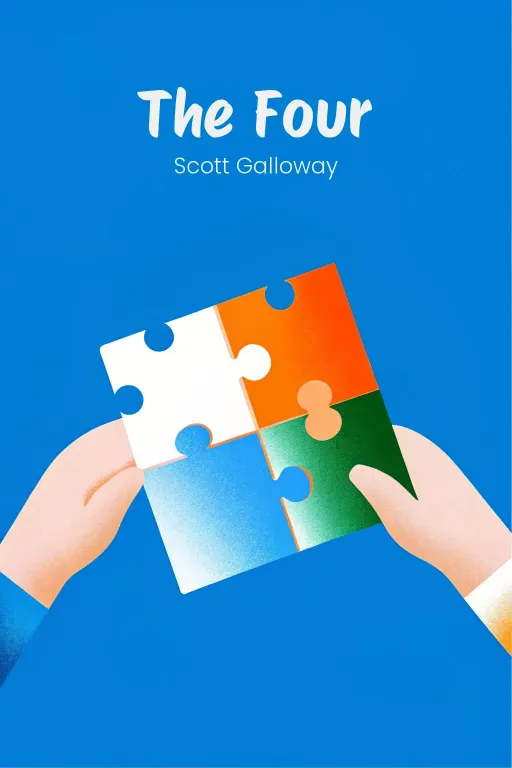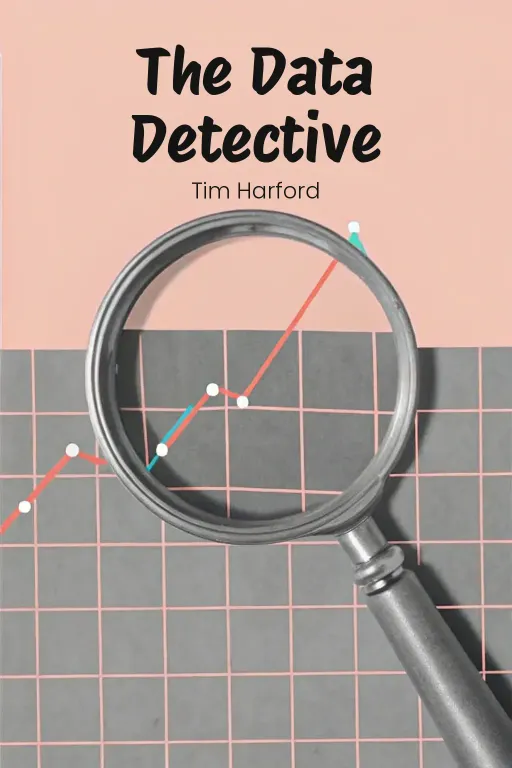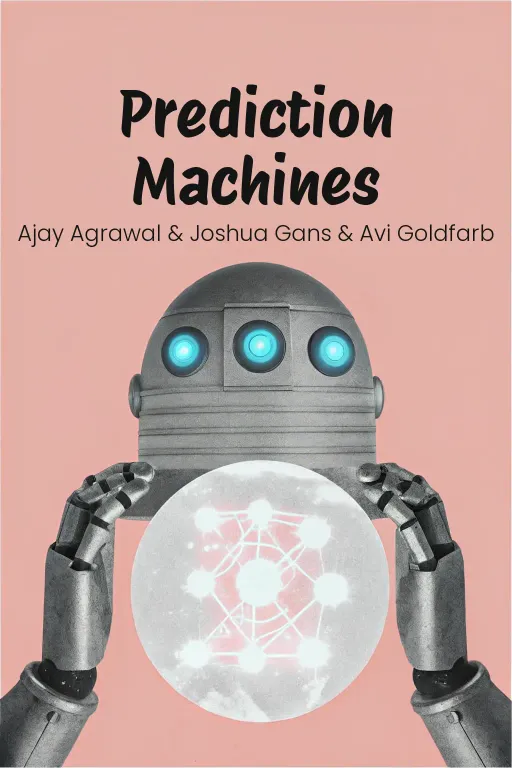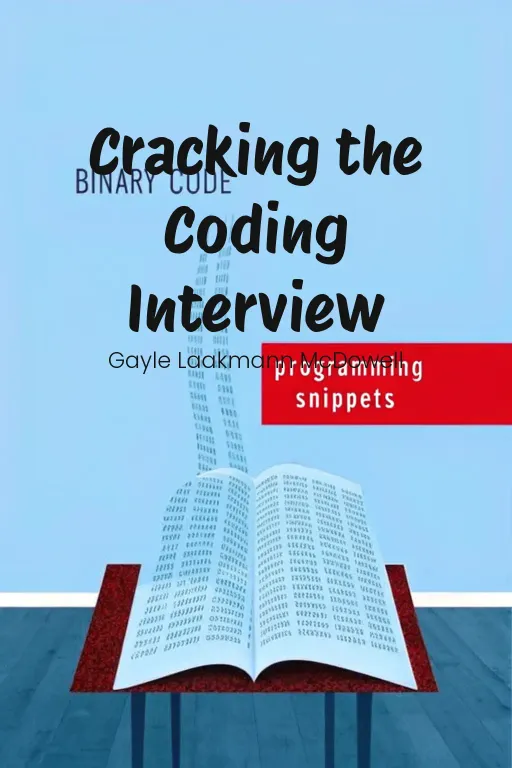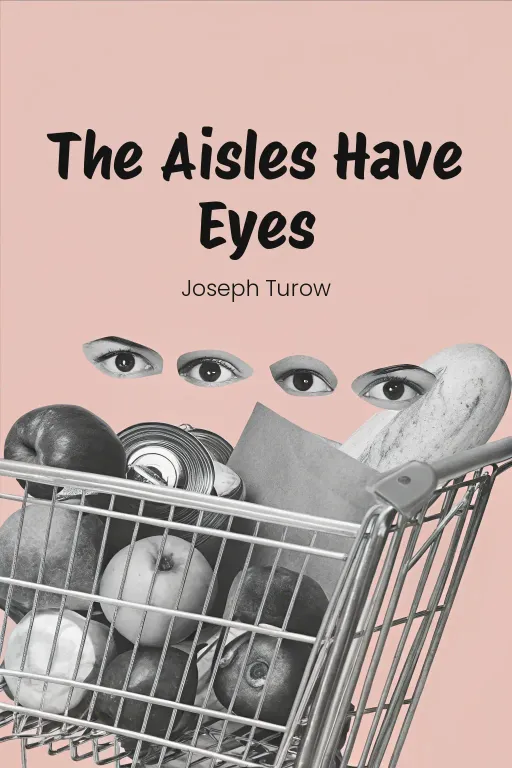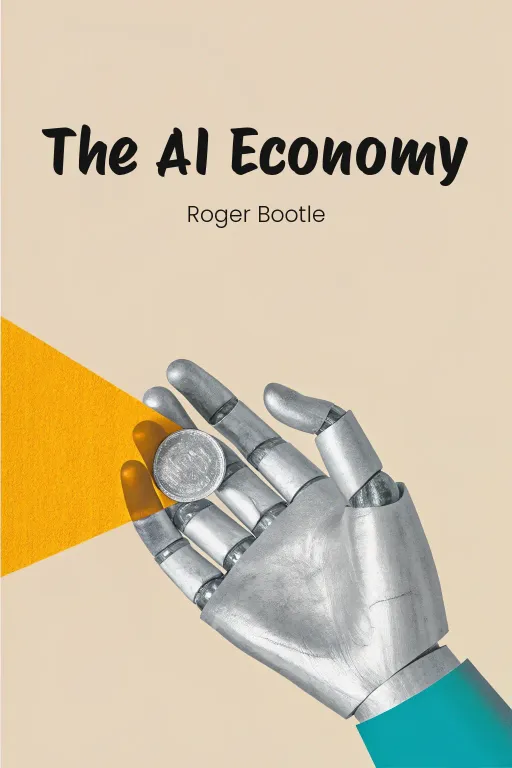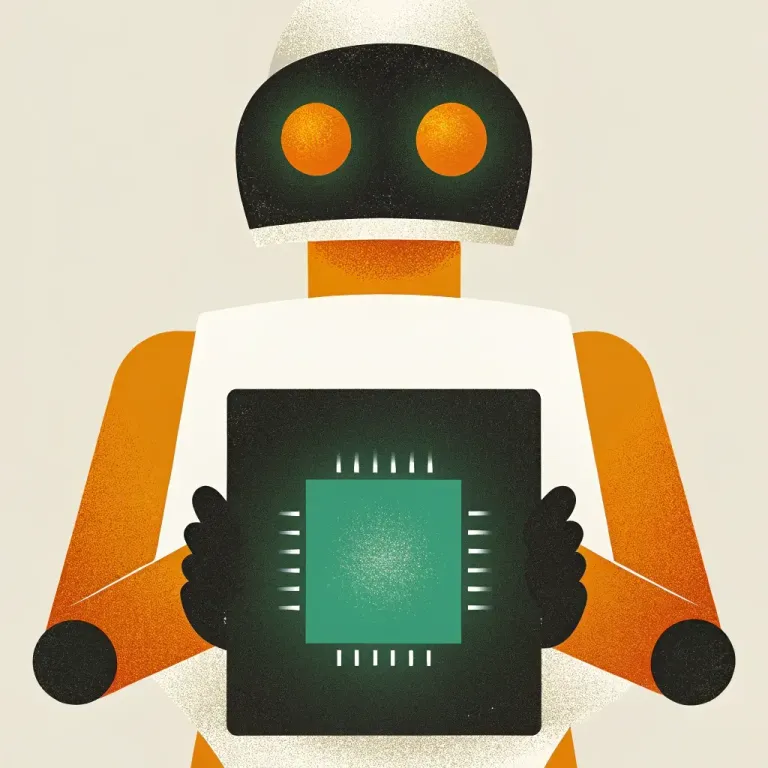
Tech & Humanity: Merge or Perish?
Podcast by Wired In with Josh and Drew
When Humans Transcend Biology
Introduction
Part 1
Josh: Hey everyone, welcome! Today, we're leaping into some pretty wild territory – the intersection of science fiction and what might become reality: a future where humans and machines… well, kind of become one. Imagine the line between biology and technology just vanishing. What does it even mean to be human then? Thrilling, right? Or maybe a little… unsettling? Stick around, because we're tackling all of it. Drew: Yeah, Josh, just a casual chat about, you know, whether humanity as we know it has an expiration date. This reminds me of Ray Kurzweil's book, The Singularity Is Near, which calls it simply "the next step" in evolution. And by "step," he means this sudden, giant leap where humans and AI get so close, they basically merge. It's quite a big dinner party to RSVP for, if you ask me. Josh: Exactly! The book dives deep into how exponential technological growth is driving us toward this Singularity – a point where human and machine intelligence fuse. Kurzweil lays out six epochs of evolution leading to this… mind-bending moment, looking at the revolutionary potential of genetics, nanotechnology, and robotics – what he calls GNR. Drew: “Revolutionary” definitely sounds exciting. But what about, you know, the potential downsides? What if, say, a nanobot gets a virus? Or genetic editing tools fall into the wrong hands? Kurzweil is taking us to the edge of the map here, and frankly, I’m not sure if paradise or pure chaos is waiting for us. Josh: Those are essential questions, Drew. That's why we're going to break this down into three core areas today: First, the Singularity itself – what is it, why does it matter, and how close are we, really? Then, we'll explore GNR technologies: these tools that could rewrite DNA, build microscopic repair bots, maybe even redefine what intelligence is. And finally, we’ll get into the ethical minefield – because, let's be real, this future could be incredible… or incredibly disastrous, depending on what we choose. Drew: So strap in, folks, because we’re unpacking everything from potentially immortal nanobots to humanity’s biggest identity crisis. And, spoiler alert, I’ll be asking the awkward, uncomfortable questions. Josh: And I’ll be here to remind you why it's worth getting a little uncomfortable exploring it all! Let's jump in!
The Singularity and Merging of Human and Machine Intelligence
Part 2
Josh: Okay, Drew, let's dive into the Singularity. Kurzweil's idea is that machines will surpass human intelligence, not just in calculations, but in actual thinking. It's a fusion, a blurring of lines between human and machine—that's the core of the Singularity. Drew: Right, so when he says “blurring lines,” he's talking about our brains joining forces with computers, creating something bigger. But his timeline, Josh? He's predicting this by 2045! Less than 25 years? Are you buying that? Josh: I am, actually. It's about exponential growth in tech. Kurzweil uses Moore's Law as support. Computing power doubles every couple of years while costs drop. Think how far we've come since the '80s. Smartphones today are more powerful than NASA's Apollo-era computers! And the closer we get, the faster it goes. Drew: True, but Moore's Law isn't a law of nature, just a trend. There are limits to how small we can make microchips. Won't we hit a wall eventually? Josh: Yeah, that's true for silicon-based chips. But quantum computing and molecular tech come in there. Kurzweil thinks we'll switch to things like quantum bits or atomic-level computing when silicon maxes out. That could keep the exponential growth going, or even boost it. Drew: So, silicon for quantum mechanics, got it. Tech aside, if we merge our minds with machines, will that change what it means to be human fundamentally? Our messy biology is part of who we are, right? Josh: That's a huge philosophical question. Kurzweil would say humans are tool-makers. We started with stone tools, now we're making cognitive tools. Each tech leap expands what we can do. So, boosting creativity, fixing health, or abolishing memory loss with AI—isn't that just evolution? Drew: Or are we outsourcing our essence to machines? If AI handles thinking, do we lose what makes us us? Josh: Well, would we “really” "lose" it? Kurzweil sees it as enhancement. Think neural implants that let you learn a language overnight, like Neo in The Matrix. It's still you—just better. Drew: Or you with pop-up ads in your brain. I also worry about access. The super-rich become digital gods while the rest of us are stuck with outdated biology. Josh: That's a fair concern, which brings us to Kurzweil's six epochs of evolution. They give us a framework for understanding this progress. He starts with atoms forming bonds in Epoch One, and we end up at Epoch Five—the human-tech merger. Drew: The epochs are interesting, how they build on each other. Epoch Two is DNA as "nature's code," shaping life. Then Epoch Three, brains... But wait, it took billions of years for brains to evolve. Does Kurzweil really think we can replicate that in decades? Josh: We're not starting from zero. The universe didn't have neural imaging or supercomputers for two billion years. We're reverse-engineering what nature already did. Kurzweil mentions things like functional MRI and neural simulations. We're mapping neurons in crazy detail. Drew: Okay, but we’d have to map out all eighty-six billion neurons and the trillions of synaptic connections in the human brain, Josh. That’s an Everest-level challenge. Josh: True, it's a huge challenge! Look at IBM’s Blue Gene/L for example, even back then, it started doing calculations like human cognition. If you extrapolate that progress to, say, 2030, it's not so far-fetched, right? Drew: Fine, say we merge brains with AI. Then what? It seems like that leads to Epoch Six, intelligence spreading into the cosmos. Honestly, the final epoch sounds like sci-fi. Josh: It's speculative, sure, but it’s also the logical end for Kurzweil. Everything leads to this: intelligence from individual brains to human-machine hybrids, then saturating the universe. Intelligence as a cosmic force, using matter and energy for things like creativity. Drew: So, the universe becomes one giant brain. Poetic, in a way. But who decides how that intelligence acts? This assumes everyone's nice, but we know how humans handle power. Josh: Good point. Kurzweil addresses that. That's where genetics, nanotechnology, and robotics, or GNR, are essential. They make this future possible, but we have to oversee them to avoid misuse or inequity. Drew: Genetics, nanobots, robotics—a futuristic toolkit with ethical dilemmas built in. We're going to talk about how these both enable and threaten the brain-machine merger, right? Josh: Exactly! Take genetics: editing our DNA to eliminate disease or upgrade our minds. You can’t get more foundational than rewriting DNA for human evolution. But beyond disease, imagine boosting memory or emotional resilience. Drew: Cue the sci-fi horror: designer babies, genetic discrimination, billionaires “upgrading” themselves beyond us. Ethical barriers everywhere. Josh: Totally. That's why discussions around equitable access and moral boundaries are super important. Then you have nanotechnology—tiny robots repairing cells, monitoring functions, or merging with neurons to enhance memory. Drew: Or accidentally causing a planetary “gray goo” if they self-replicate. I’m just saying, exponential progress implies exponential risks. Josh: And exponential opportunities, Drew. Merging humans and technology has huge medical implications, from curing cancer to countering cognitive decline. It represents a way to rewrite our limitations as biological beings. But you’re right—it emphasizes the need for careful regulation. Drew: We’ve got a lot of ground to cover with these technologies—and whether they’ll heal humanity or create massive new divides. You ready to jump into to the rest of this toolkit?
Foundational Technologies: Genetics, Nanotechnology, and Robotics (GNR)
Part 3
Josh: So, shifting gears from understanding the Singularity, let’s talk about the technologies actually driving this change. Genetics, nanotechnology, and robotics – or GNR as they’re often called – are really at the heart of this new era. Each of these fields is just exploding with progress, unlocking possibilities we never even dreamed of. Today, we’re diving into how these technologies are not only fueling progress, but also introducing some pretty serious risks. Drew: Exactly. Because, Josh, while GNR sounds like the ultimate team for conquering diseases, boosting intelligence, and even reversing aging, it also sounds like the setup for a “really” terrible sci-fi movie, right? Self-replicating nanobots, and bioengineered pathogens... It's like every innovation has a potential catastrophe hiding inside. So, where do we even begin pulling at these threads? Josh: Let’s start with genetics, the very blueprint of life. Since the discovery of the double helix, we've been steadily decoding DNA. Now we have tools to actually manipulate it – like RNA interference and gene therapy. Want to silence a faulty gene? With RNAi, scientists can effectively “switch off” bits of defective DNA that cause diseases, especially those caused by a single faulty mutation. Drew: Okay, switching off defective genes sounds great, Josh, but you know biology – nothing is ever that simple. What happens when we don’t understand all the knock-on effects? Could tweaking one gene solve one problem, but then create ten more we didn't see coming? Josh: That’s definitely true, but we’re getting better at predicting those effects. Beyond just targeting specific mutations, gene therapy is being used to regenerate damaged tissues, and even combat age-related decline. Imagine a future where your failing heart is rejuvenated using your own cells – or where genetic disorders that were once terminal are completely prevented! Drew: Those scenarios sound incredible Josh – at least until we start thinking about "designer genes". Not just enhancing health, but intelligence, athletic ability... doesn't that risk creating a new kind of class divide? Genetically enhanced elites versus the rest of us, who are suddenly genetically obsolete? Josh: That’s a very real ethical concern that needs addressing. If genetic enhancement is expensive and inaccessible, it's going to foster inequality rather than solving it. But that's where governance comes in, to develop fair frameworks for innovation. Still, genetics is just one piece of the puzzle. Let’s move to something even smaller: nanotechnology. Drew: Ah yes, the molecular revolution! Imagine nanobots swimming through your arteries, specifically repairing tissue damage, or zapping cancer cells with the precision of a laser. Sounds pretty amazing in theory, until... it doesn’t. Want to tell our listeners about this cheery "gray goo" scenario? Josh: Well, in theory, if self-replicating nanobots went unchecked, they could consume all biomass as fuel for endless replication! The result would be a hypothetical apocalypse where the Earth is reduced to a lifeless, gray sludge. But that’s a highly speculative, worst-case scenario, Drew. Drew: True, but speculative risks have a funny habit of not staying speculative forever. And it’s not just gray goo – what about invasive uses, like nanotech surveillance, or embedding malware into nanobots? It’s not just a technical problem; it’s really a question of trust. Josh: And it really underlines the need for rigorous oversight. But let's think about the upside. Imagine medicine completely transformed by precision targeting. A world where, instead of chemotherapy damaging healthy cells, nanobots dismantle only the cancerous cells. This is medicine at an unprecedented level of safety and effectiveness. Drew: Assuming these bots are impeccably programmed, and there are zero corporate conflicts of interest, right? Like, they're not secretly collecting data on how long your liver lasts under stress. Josh: Cynicism noted, Drew, I expected so. But, think inward a bit. Nanotechnology could also open new paths for cognitive enhancement by interfacing directly with our neurons. That could mean enhanced memory, faster processing of complex thoughts, or even seamless multilingual fluency. Drew: Another way to say it is – making the human brain hackable. All it would take is a hacker with bad intentions, or worse, a rogue state to overwrite or even control our thoughts! Josh: Hence the ethical and regulatory challenges. But this leads into the last pillar of GNR: robotics, and specifically AI. This is the most visible of the trio – we already see narrow AI integrated into everyday life. Think self-driving cars, speech recognition, and even medical diagnostics. Drew: Right, then comes strong AI, where things go from task-specific brilliance to human-level cognition. That’s what has the optimists dreaming of robot philosophers, and the skeptics, like me, imagining Orwellian levels of dystopia. Josh: Well, Kurzweil actually predicts that strong AI, paired with robotics, could solve otherwise intractable problems – global warming, disease eradication, even interstellar travel. Drew: Sure, but at what cost? Even narrow AI raises tough questions about accountability. If a self-driving car makes a mistake, who’s to blame? Multiply that by strong AI, wielding more influence than governments do. Who’s “really” in control? Josh: Drew, no one is saying that implementing strong AI comes without any strings attached. But if aligned properly, it could augment our human decision-making, instead of replacing it. Drew: "Could" is doing a lot of work there, Josh. These techs don’t exist in a moral vacuum. Humans program them, and humans tend to bring their own biases, blind spots, and yeah, even self-interest into everything they touch. Josh: I'll admit what you’re saying really underscores why Kurzweil emphasizes a balanced approach going forward. Genetics, nanotechnology, and robotics are incredibly powerful tools, but they are also double-edged swords. Ultimately, what we choose to do with them will shape whether we end up in a utopia, dystopia – or yeah, somewhere in between. Drew: Well said. Let me close with this then: It's not just about achieving technological breakthroughs; it's about responsibility. The real challenge with GNR is putting safeguards in place before our ambitions run away from our wisdom.
Ethical and Societal Implications of Technological Advancements
Part 4
Josh: So, with all this technology coming into play, we really have to think about the ethical and societal implications, right, Drew? I mean, when we talk about merging with machines or even rewriting our DNA, we're stepping into some seriously complex territory. It's not just about what's possible anymore; it's about what's right for society. Drew: Exactly, Josh. It's like, these aren't just upgrades to our phones; we're talking about potentially redefining what it means to be human. So, what's the plan? How do we even begin to navigate all this? Josh: Well, these advancements are happening fast, and they're going to redefine some fundamental things: how we see ourselves, our privacy, and the balance of power, all of which is to say that we need to engage, tackle these ethical issues head-on. We’ve got to figure out how we embrace the good stuff while also putting guardrails in place to prevent misuse. Drew: And of course, there's that huge, glaring issue of inequality. Will all of this lift everyone up, or are we just paving the way for even bigger gaps between the haves and have-nots? So, remind me again, what are the main areas we're going to break down? Josh: Right, so we're going to look at three key areas. First up, we'll talk about how these augmentation and genetic editing technologies are messing with our sense of identity. Then, we'll dive into the privacy concerns, which, let's be honest, are pretty massive in our data-driven world. And finally, we'll tackle inequality, you know, the risk of these breakthroughs leaving vulnerable populations even further behind. Drew: Alright then, Josh, let’s jump down this rabbit hole. Identity first! In this new world of cyborgs and gene editing, are we losing ourselves? Josh: Identity is changing big time. Think about genetic engineering and body enhancements. We're getting to the point where we have to ask: where does biology end, and technology begin? There's this concept called Natasha Vita-More’s “Primo Posthuman”. It's basically a vision of a human body packed with biosensors, artificial organs, and even direct AI hookups. A superhuman prototype, designed for crazy long life and all sorts of enhanced abilities. Drew: Sounds…intense. And a little terrifying, to be honest. I mean, imagine a world where some of us are just regular folks and others are these super-powered "Primos." How do we avoid a massive identity crisis…or even a caste system? Josh: It's a valid worry. If some people are walking around with souped-up cognitive and physical abilities, it could “really” shake up our ideas about individualism and equality. We'd have to rethink what being "human" even means. Is it just about our biology? Or is it about our ability to evolve using tools and innovation? Drew: Okay, let's throw a wrench in that whole "evolution" argument. If someone's constantly upgrading themselves with tech, at what point do they stop being…themselves? I mean, if we're replacing memories with enhanced storage or swapping out body parts, does any of the original individuality even stick around? Josh: Right, and that’s a “really” important question. The philosopher Derek Parfit talked about identity as a continuous psychological connection. Basically, if your thoughts, experiences, and self-awareness are still there, then you're still you. But if huge chunks of our humanity become tech-driven, it kinda challenges our norms around agency, accountability, and even morality. Drew: And this whole "evolution on steroids" thing is something we haven't always handled well. I mean, these things can get hijacked so fast. Picture the ads now: "Upgrade your memory! Only $9.99 a month!" That's not evolution, Josh—that's consumerism mixed with a healthy dose of existential dread. Josh: Exactly! That's why it's so important to have ethical guidelines in place. We have to make sure that progress doesn't come at the cost of fairness or individuality. But let's pivot for a second, because there's something else we need to talk about: privacy. Drew: Ah, privacy. A relic from the days of analog. Let me guess: things like biometrics and AI aren't exactly giving us a stronger sense of personal space, are they? Josh: Not exactly, surveillance technologies, like facial recognition, are seriously effective for things like public safety and catching criminals. But if they're used without any oversight, they can eat away at our privacy super fast. Take China's nationwide surveillance system, for instance. It's massive, and it uses facial recognition for all sorts of things. Drew: Yeah, where algorithms are deciding if you can buy a train ticket or even leave the country. That's not innovative; that's a dystopian novel waiting to happen. Josh: And that's the problem with convenience, right? Systems like that might make things more secure or efficient, but they also concentrate power in the hands of a few—whether it's governments or corporations. And that's a slippery slope for suppressing dissent or manipulating people. Drew: It's like a digital panopticon—people start censoring themselves just because they know they're being watched. So the question is: how do we balance the advantages of these technologies against their potential to strip us of our autonomy? Josh: Transparency is key. If we had globally agreed-upon standards prioritizing data governance and user consent, that would be a great start. But you're right—if we don't keep this in check, it could undermine democracy itself. Drew: And you know, this isn't just some abstract, philosophical thing. It gets personal pretty quickly. I mean, if our medical or financial data is being tracked, stored, or even hacked, we're in dangerous territory. And I'm guessing this isn't affecting everyone equally, is it, Josh? Josh: No, it's not! And that's what brings us to our last point: inequality. These breakthroughs promise to elevate humanity, but unless we can make sure everyone has access, we're looking at a major digital divide. Drew: So, the age-old question: who gets a seat at the table, and who's stuck doing the dishes? Josh: Exactly. Even today, things like high-speed internet and digital learning tools are still out of reach for too many people. And without someone stepping in, this tech gap is just going to get wider. Wealthy countries will be using cutting-edge solutions for health and productivity, while underserved communities get left behind. Drew: Yeah, it’s like we're setting up a new form of inequality. Forget economic classes – what about genetic or neurological classes? If only the wealthy can afford upgrades or AI integration, everyone else becomes obsolete. Josh: That's why it's so important to bridge this gap. Governments and organizations need to push policies that make technology more accessible. Things like subsidized access, funding for digital infrastructure in rural areas, and training programs to help people adapt to an automated workforce. Drew: And throw in some regulations to prevent monopolies on these breakthrough technologies. If the most transformative innovations are locked behind paywalls or patents, we'll end up with an elite ruling class faster than you can say "augmented overlords." Josh: Couldn't agree more. And it's worth looking at historical examples. Remember the Asilomar Conference, where scientists voluntarily set ethical boundaries for genetic research early on? We could use that same kind of collective responsibility to guide us now. Drew: But it will take more than good intentions. Enforcing accountability means placing limits on corporate, governmental, and even individual power, and the stakes are too high to rely on people's better nature. Josh: Well said, Drew. When we combine rigorous oversight with inclusive policies, there’s hope for a future where technology truly elevates all of humanity. We need to make sure we’re innovating not just wisely, but ethically.
Conclusion
Part 5
Josh: Alright, so, to bring it all together, today we’ve “really” dived deep into Kurzweil's Singularity – this idea of humans and machines merging and totally transforming everything from our bodies to our minds, maybe even the whole universe. We talked about how genetics, nanotechnology, and robotics—the GNR triad—could revolutionize things, potentially wiping out diseases, boosting our intelligence, and fundamentally changing what it means to be human. Drew: Yeah, but let's not just gloss over the potential downsides, Josh. I mean, we're talking about things like nanobots running wild, the risk of creating even greater inequality through these technologies, or even losing our autonomy in a world run by algorithms. The ethical and societal implications are huge, you know? Things like privacy disappearing or this digital divide getting even wider. If the Singularity is “really” coming, the big question is: will it bring us together or tear us apart? Josh: Exactly! That’s “really” the key question, Drew. As we stand at the edge of these incredible breakthroughs, it's up to all of us—not just the scientists or the politicians—to make sure these technologies are used wisely and fairly, for everyone. Drew: So, what's the bottom line here? This future, it's not something that's just going to happen to us passively—we're actively creating it. So maybe ask yourself: what kind of world do you want to build as we face these massive changes? Because whether we like it or not, we’re all part of this. Josh: Precisely, Drew. If we can combine that drive to innovate with a real sense of responsibility, we actually have a chance to “really” improve the human experience. We just need to make sure we do this right. Drew: Well, on that note, Josh, I think we've given our listeners plenty to think about. So until next time, everyone, stay curious—and, you know, maybe a little bit skeptical too. Josh: And keep those dreams big while still asking the tough questions! Thanks for tuning in, and we'll catch you next time.
